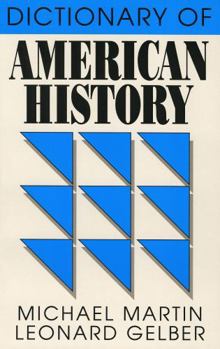Dictionary of American History
Select Format
Select Condition 
Book Overview
Customer Reviews
Rated 5 starsVery Helpful
This little book/dictionary has a brief and succinct account on almost every main event, person, court case, legislation, etc. It even conveniently includes a copy of the US constitution at the end. If you are looking for a quick reference or maybe something to refresh your memory, then this book is perfect for you. However, if you are looking for an in depth analysis on various historical events, people, etc. then I wouldn't...
0Report
Rated 5 starsA Rich Reference Book
Dictionary of American History, Michael Martin & Leonard Gelber The authors attempted to provide a reference to events of American history such as economics, finance, labor, law, social welfare, literature, industry, science, religion, commerce, and foreign policy while not skipping political and military events. They carefully selected and edited this range of materials for the widest audience. Biographical items provide...
0Report
Rated 5 starsvery interesting and cultured
I'm a French studient and I'm studying English at University. The University library had it and I find it very instructive so I recommand it to the other students.
0Report













